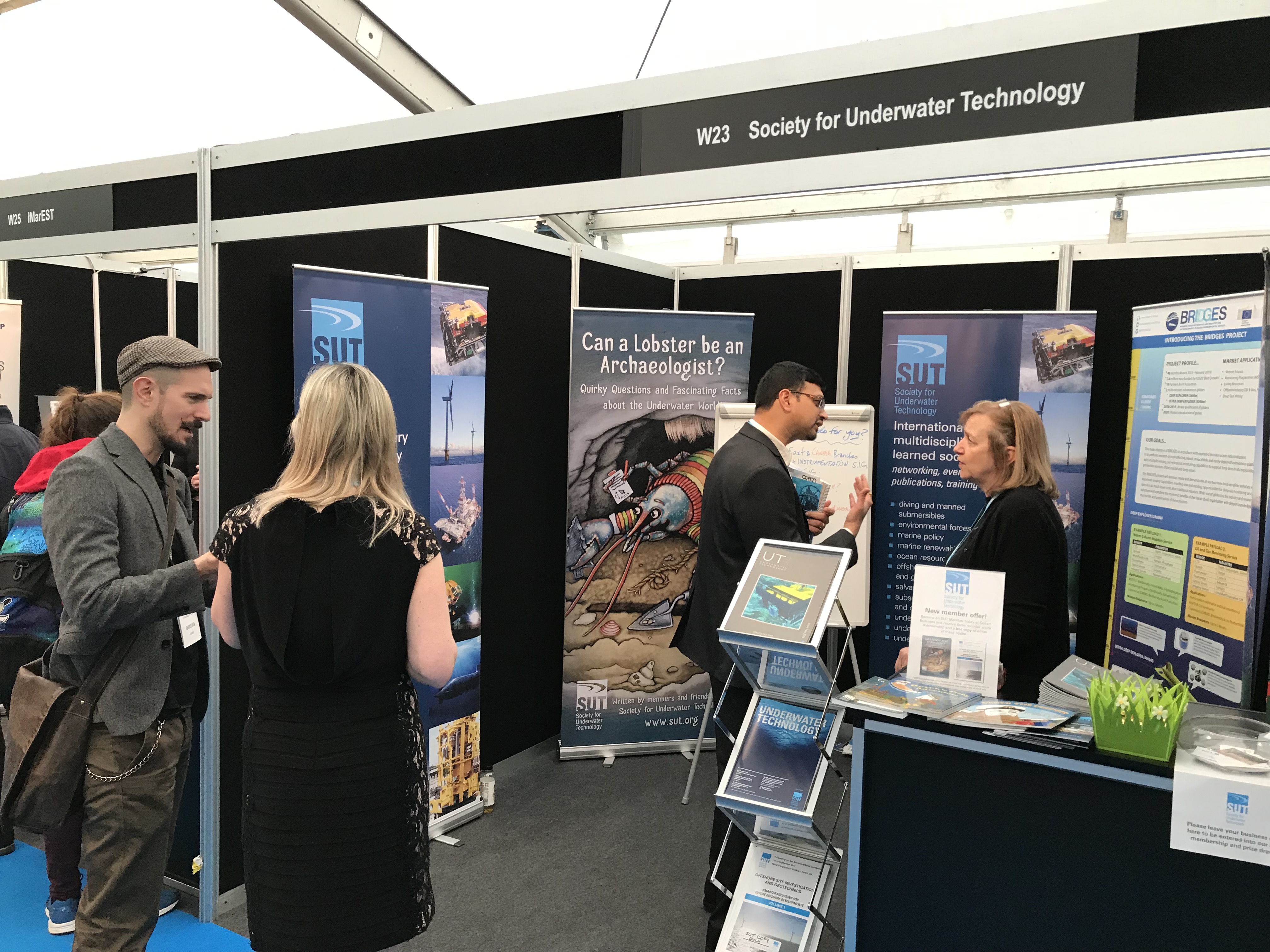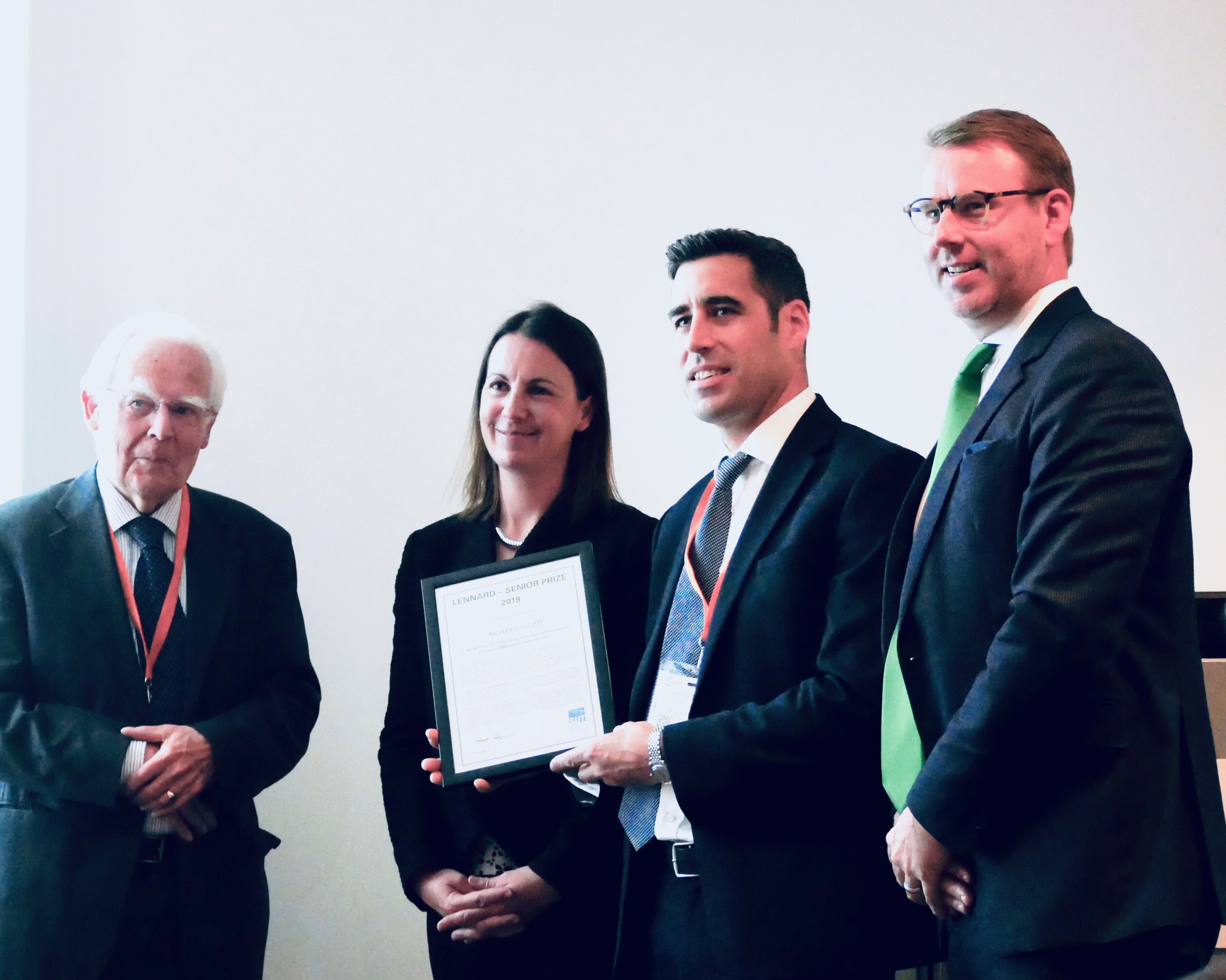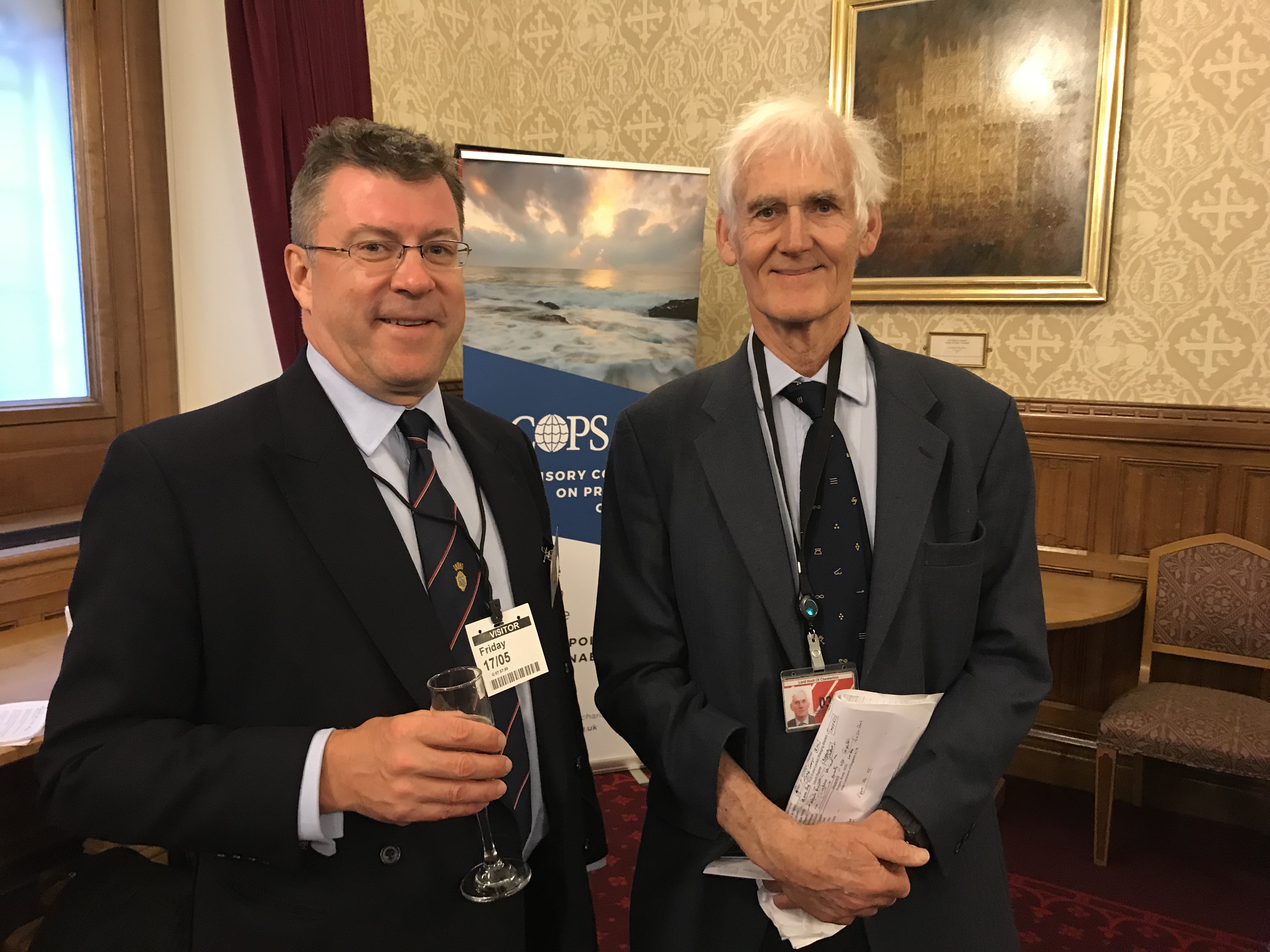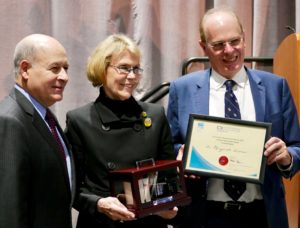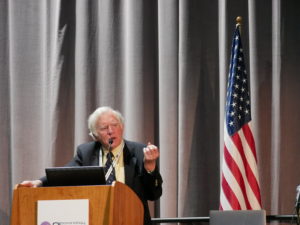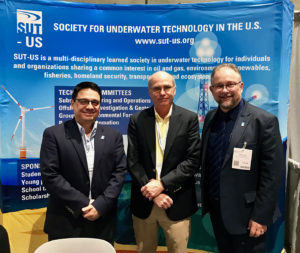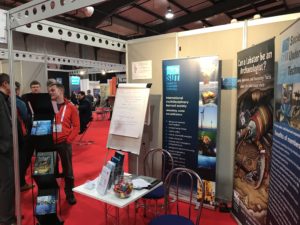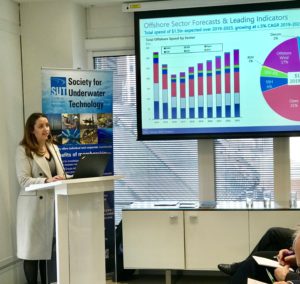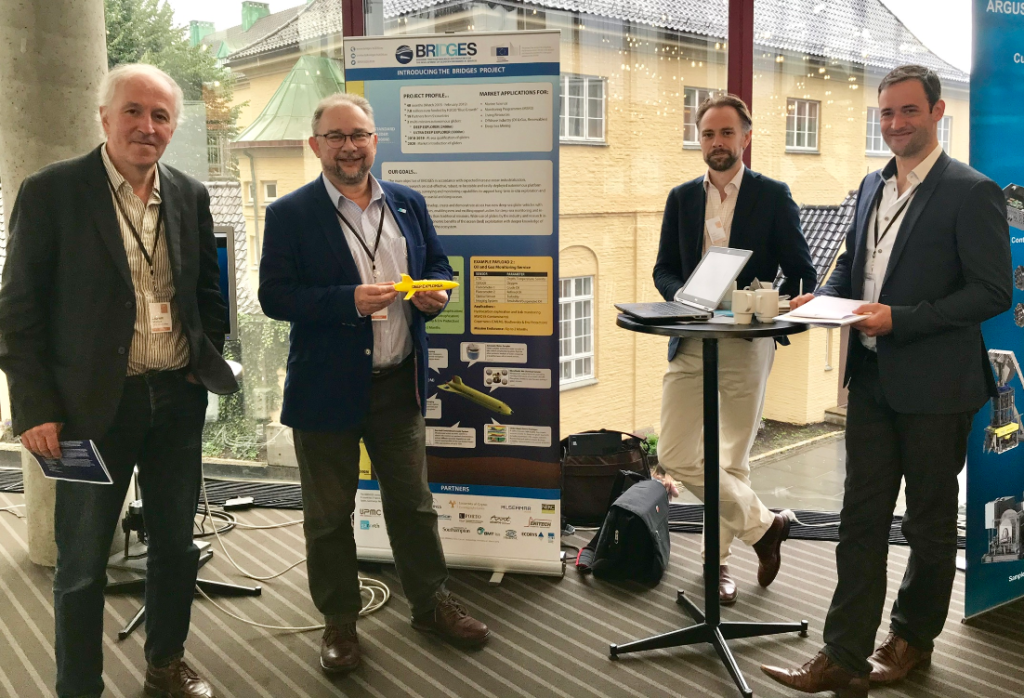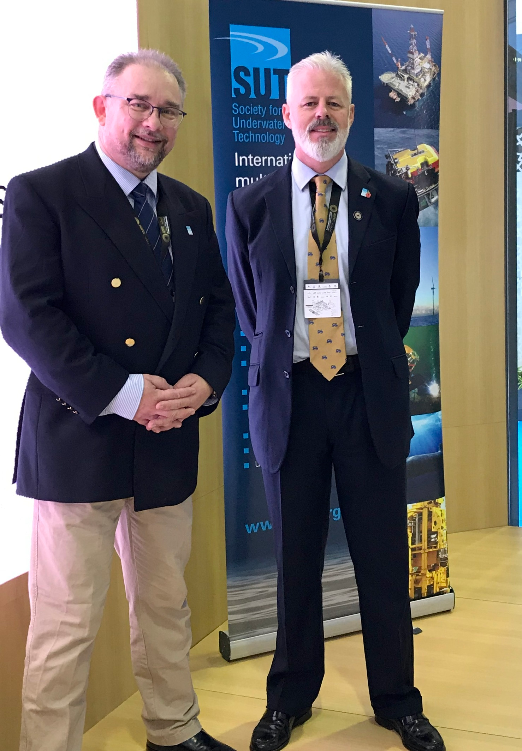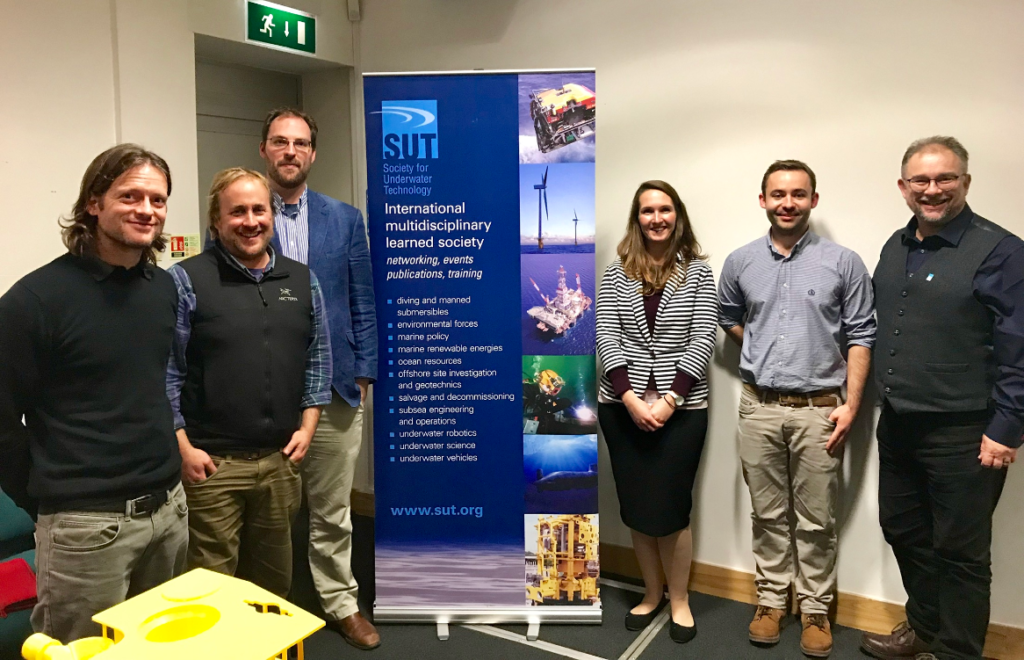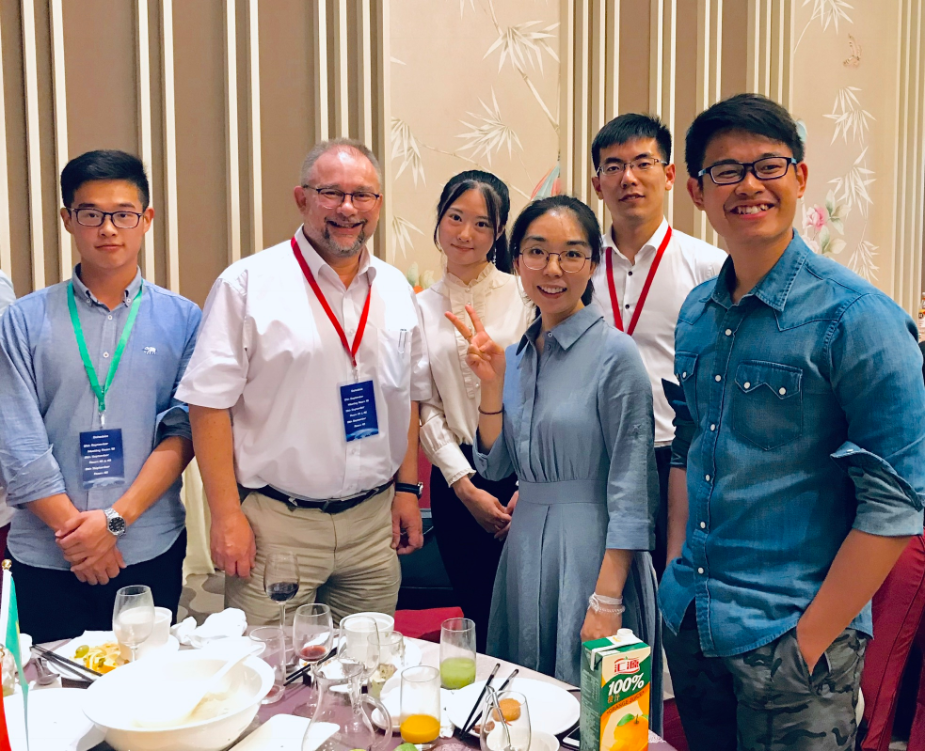Dear Members and friends of SUT, time has flashed by since I last wrote to you so there’s quite a lot in this newsletter. You can see that we’re busy raising SUT’s profile, opening new branches and supporting our long-term members.
April started with the well-attended Ocean Business event at the National Oceanography Centre in Southampton. It is one of the most popular of the cycle of trade shows, conferences and exhibitions thanks to the dock-side location where exhibitors can demonstrate systems, sensors and an ever-widening variety of autonomous surface and sub-surface systems. Many people comment that it reminds them of the buzz from pre-year 2000 Oceanology International exhibitions when it was located in Brighton, helped by the evening presence of friendly hostelries just outside dock gate 4 and a rich social events list. We had our customary stand in the marquee alongside the dock, were able to interact daily with members and colleagues from sister Learned Societies and Professional Bodies, & contribute to the conference programme. I also gave talks at the careers session and had one-to-one meetings with early career technologists and students to help them seek employment opportunities and give them some ideas about where to focus their efforts.
It was good to see that our friend Versha Carter was thanked for her contribution to getting Ocean Business established and successful, and to our SUT Plus member Claire Cardy receiving the Society for Maritime Industries Marine Science & Technology Business Person of the Year 2019 Award – Claire is now a Director at Nortek and is making a real impact on our community.
Meetings were held by our Marine Renewable Energy Committee, members of the Defence Special Interest Group, Offshore Site Investigation and Geotechnics group and by the Panel on Underwater Robotics. With plenty of SUT members on hand we were able to hold meetings of the SUT executive committee, and engage in detailed discussions with our friends from IMarEST and the Marine Technology Society, which I shall expand upon next.
Accreditation and Professional Registration
SUT is a Charity and a Learned Society, but is not (in UK law) a Professional Body, able to issue things such as Chartered Professional Status. In the UK, only bodies awarded a Royal Charter by the Privy Council can do that, such as the Royal Institution of Chartered Surveyors or Institute of Civil Engineers. Another is the Institute of Marine Engineering, Science & Technology (IMarEST) who have for decades worked closely with SUT and even hosted our headquarters at various times.
After several months of negotiations, we’ve reached agreement with IMarEST to conduct a trial run of acting as a body licenced by IMarEST to issue Chartered Professional Status to our own members, using the IMarEST assessment system and professional categories at first, before developing our own unique post-nominals. From September 2019 we’ll trial a group of about a dozen SUT Members who wish to become Chartered Marine Technologists, and if it’s successful we’ll role out Chartered Marine Engineer and Chartered Marine Scientist in due course, before aiming to develop specialisations such as Chartered Marine Technologist (ROV) or Chartered Marine Engineer (Subsea). If you’d like to be part of that first cohort please drop me an email and I’ll bring you up to speed. Exact pricing is yet to be confirmed but we won’t be undercutting IMarEST’s own fees out of fairness to them, however it does save you the annual cost of also being an IMarEST member if you aren’t one, and you will be able to make an offset for the costs in your tax returns as a formal professional registration fee.
You don’t have to be based in the UK to use the scheme, and it’s quite a vigorous process to ensure that you are up to the required professional standard – but by 2020 we should have the first SUT Members able to use the postnominals CMarTech on our books. It’s a big step forward for SUT, and in time will have quite an impact as we evolve new methods of continued professional development and record keeping, but it will start off small so that we can learn as we go, with support from IMarEST.
SUT and the Marine Technology Society
The other big news is that we’re working with the US-based Marine Technology Society towards an enhanced level of cooperation so that we can help one another in the areas where we operate, increase our collective impact rather than compete in a destructive manner, and try and avoid holding major events and conferences the same week, grow bonds by inviting members to our events and so on. Why should we do so? MTS and SUT are both 1960s-formed organisations with very similar remits, and in a crowded space for Learned Societies it makes sense to co-operate for mutual benefit. MTS are primarily based in the USA & Japan, with high levels of membership in places such as the Woods Hole and Scripps communities, whereas SUT has a broader spread of international membership, and much higher engagement from offshore industry, only significantly overlapping with MTS in Houston – so we’ve made sure that our US branch is aware of the conversations we’ve had, and is able to have their voice heard from the top down.
Rick Spinrad, the MTS President, is well known to me from my former life as Vice Chair of UNESCO’s Intergovernmental Oceanographic Commission as he was a senior member of the US ocean science community, and has known Ralph Rayner, SUT President, for many years. Rick also intends to visit our Perth Branch and attend the AUT 2019 conference in October (https://sut.org/event/perth-aut-2019-conference/) MTS have already voted for a President Elect to succeed Rick, former US Navy officer Zdenka Willis who some of you will know from her work with the US sustained ocean observing programme and Oceanology China events. Zdenka is a keen supporter of growing a closer relationship between SUT and MTS and her eventual appointment ensures stability in our relationship for the next few years.
Defence
SUT now has an embryonic Defence Special Interest Group, initially chaired by Rolly Rogers. The focus is on marine autonomous systems and advanced sensors in a defence context, so for now we’re keeping it invitation-only until the Group has fully agreed the Terms of Reference and level of security clearance requirements, if any. Message me if you’re interested and would like to be a member. Initially NATO-only plus Australia and New Zealand, but this may evolve as the group matures.
SUT Middle East
Adrian Phillips has worked wonders in a short time getting a new SUT Branch up and running in the United Arab Emirates. The first meetings have been held in Abu Dhabi & Dubai, and the core team are already planning new events, engagement in ADIPEC and many other activities. They’re now on the SUT Website, or you can contact Adrian direct at [email protected] to find out more.
SUT West Africa
We’re helping the team in Lagos rebuild SUT in West Africa, and they’ve already held their first Subsea Awareness Course, & started to gain new corporate members. It’s a steep learning curve, and the branch will need assistance and patience as we see it grow and flourish. If there are experienced SUT members reading this who are very familiar with how west Africa works, and are interested in helping to grow and support the Branch, please get in touch as it’s a part of the world where we should be operating, helping to transfer knowledge and build local capacity.
NOC Association & MASTS
I was invited to represent SUT at the National Oceanography Centre Association meeting on 9th May, where we learned about the forthcoming UN Decade of Ocean Science for Sustainable Development, as well as the plans for NOC to enter the private sector as a not-for-profit entity. They have been long-term members of SUT and we have a good relationship with the staff, a number of whom serve on our committees and special interest groups. SUT Corporate Membership provides some valuable insight from industry to the people at NOC, and our advice and input to their future development is appreciated. On a similar front I have been invited to the Marine Alliance for Science & Technology Scotland (MASTS) meetings, as has Moya Crawford (Chair of our International Salvage & Decommissioning Committee); we create a substantial contribution to their annual science meeting with a specialist salvage and decommissioning workshop.
LSE evening meeting
I enjoyed the Subsea 2.0™ & iEPCI™ evening presentation hosted by TechnipFMC on 9th May, very educational for people like me who don’t come from an oil and gas industry background. The use of virtual reality headsets really put you into the centre of the virtual oilfield and I learned a lot.
All-Energy
I spent a couple of excellent days in Glasgow in May, visiting the facilities at Strathclyde University, and attending the All-Energy exhibition and conference where Dr John Sharp, Chair of our Marine Renewable Energy Committee, was able to award the Lennard-Senior Prize to Andrew Scott, very well deserved and a rare occasion where previous winners were also in attendance. Thanks go, as ever, to Judith Patten for her energy and enthusiasm, and to the Reed Exhibitions team who ensured another good show in Glasgow.
It did however raise again the awareness that we need a Branch or Chapter to cover pent-up demand for SUT in the Glasgow-Edinburgh-Central Belt region, as there is much happening but it’s too far to be effectively run from Aberdeen. Definitely one for my ‘to-do’ list – volunteers to get something up and running would be appreciated.
SUT US & Oceanology Americas
I was really pleased to see that our US Branch have entered into an agreement with the organisers of Oceanology Americas to support the future conference series. Jan Van Smirren, supported by Zenon Medina-Cetina and the Houston staff had done a superb job with the Oceanology Americas 2019 conference in San Diego, so it’s great to see that we’ll be continuing to grow that series in 2021. Well done to all concerned.
ACOPS reception
On 17th May Keith Broughton of LSE Branch and myself were honoured to be invited by Lord Julian Hunt to an evening reception at the House of Lords by the Advisory Committee on Protection of the Sea, ACOPS, one of the oldest ocean-related NGOs started off by the late Prime Minister Lord Callaghan back in 1953, when as a junior MP he’d noticed oil pollution staining the swimming costumes of his children when holidaying in South Wales and visiting the beach. In those days ships would routinely flush their tanks at sea and Callaghan’s efforts eventually led to the banning of that practise. His daughter, Baroness Jay, was present at the meeting. We had very good presentations from Lord Hunt, our good friend & SUT Member Dr Philomene Verlaan (a rare example of a lawyer who is also a sea-going research scientist, specialising in ocean mining) and ACOPS director Dr Youna Lyons, who is based in Singapore – so a possible future link with our Branch there. I subsequently met with Philomene and Youna the following week for a detailed marine policy discussion – SUT’s links with academia, industry and government puts us in a unique position to help inform debate and discussion on ocean stewardship, resources and future management systems.
Aberdeen SAC
We had another successful Subsea Awareness Course in Aberdeen, showing again that the industry is recovering and demand for placing staff on courses is rising. My thanks to Jacqui and Lisa, our Aberdeen-based staff, and to our volunteer instructors Tony Laing, John Lawson, Paul Benstead and Bill Nicholson from BP, Sean Bonner and Steve Christison of BHGE, Joao Melo, John Harris, Andrew Reilly, Darren Philp and Vicky McBain of Oceaneering, Scott Cassie, Paul Yeats, David Yule, François Avon, Steve Benzie, Craig Flockhart, Stuart Rae, Mark Main, Gordon Craig, Paul Hekelaar, Ben Mair, David Procter and everyone else involved at i-Tech 7, Dale Tikasingh and Kevin Attree at ProServ, and Hooman Haghighi, & Keith Anderson from Wood.
Xodus reception
On 23rd May I was invited to the launch of the refurbished offices of Xodus Group in London. I was particularly impressed to learn that they had recruited 30 young people in the last 12 months, it’s brilliant to see innovative companies encouraging new engineers, technologists and scientists into the subsea sector and taking a real interest in getting them well trained and engaged with complex projects from the start.
ErasmusMATES – Skills for the Blue Economy
Back into the policy space, I was invited (and paid for) to attend a meeting in Brussels on 28th May about how we train the next generation in skills and academic subjects to service the needs of the emerging blue economy in Europe and beyond. It was an opportunity to present the role of Learned Societies such as SUT to policy makers, academics and European civil servants. Regardless of ‘Brexit’, SUT is an international organisation and our members will be working all over the world as we move into a whole new realm of offshore industries, discovery and technologies in coming years.
Coming soon
I’ll be talking on 12th June on the theme of ‘Blue future – New technologies, new ocean industries and SUT’s role in delivering the Blue Economy as a midweek lunch and learn – register for tickets at https://sut.org/event/london-south-of-england-lunch-learn-save-the-date/ it will be good to meet members and talk about the future.
In June I’ll also be meeting with colleagues from the Marine Biological Association and IMarEST to see how we work together more effectively, and we’ve been offered free stand space at the IEEE-MTS ocean conference in Marseilles. If anyone is in the area and would like to volunteer to ‘man the stand’, please get in touch – but time is short as it’s 17-19 June.
For those of you interested in the defence space we are one of the Learned Society supporters of the wonderfully-named ‘Engine as a Weapon’ conference, number 8 occurs this year in July – see https://www.eaaw.org.uk/ Future naval platforms will have directed energy weapons, magnetic railguns and other features straight out of science fiction, and the young engineers and technologists in training today will deliver that capability.
Membership renewals go out in July and this year we’ll be launching a Patrons Scheme too – I’ll send out a separate message for Members describing the scheme, its aims & objectives, and the benefits of becoming a Patron of SUT as soon as possible.
We do still need to ensure our survival by growing the Society – so please encourage your friends and colleagues to join SUT, as individuals or as Corporate Members – we still lose more people than we gain each year as members retire from the industry and the next generation don’t join in their place. I’m hoping that launching the accreditation system mentioned at the start of this newsletter will start to bring in a new cohort of members, but the need to grow is urgent and ongoing. Bring a colleague!
Finally, after two years in Chancery Lane it’s time for a new office contract, and the best value option we’ve found is to move a few hundred metres north to John Street, WC1N, off Gray’s Inn road. For those of you who’ve visited our current office, you’ll know that it’s in a basement with no natural sunlight, and after two years in the dark my staff and I are going a bit mad, so we’ve chosen a nice space with a window and sunlight to see us through the next couple of years as we progress from where we are now to a growing Society able to offer professional registration, the beginnings of a global network of allied Societies and a key role in delivering the UN Decade of Ocean Science for sustainable development too. It’s going to be challenging, and fun.
Steve Hall 4th June 2019 [email protected]

